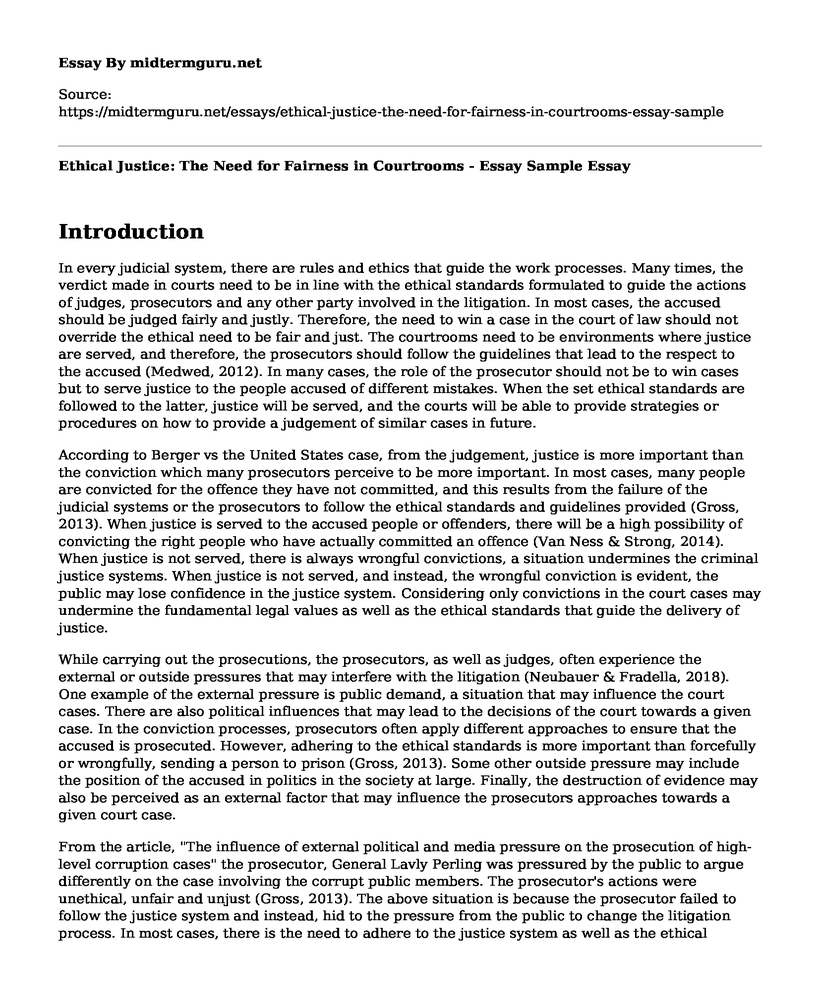Introduction
In every judicial system, there are rules and ethics that guide the work processes. Many times, the verdict made in courts need to be in line with the ethical standards formulated to guide the actions of judges, prosecutors and any other party involved in the litigation. In most cases, the accused should be judged fairly and justly. Therefore, the need to win a case in the court of law should not override the ethical need to be fair and just. The courtrooms need to be environments where justice are served, and therefore, the prosecutors should follow the guidelines that lead to the respect to the accused (Medwed, 2012). In many cases, the role of the prosecutor should not be to win cases but to serve justice to the people accused of different mistakes. When the set ethical standards are followed to the latter, justice will be served, and the courts will be able to provide strategies or procedures on how to provide a judgement of similar cases in future.
According to Berger vs the United States case, from the judgement, justice is more important than the conviction which many prosecutors perceive to be more important. In most cases, many people are convicted for the offence they have not committed, and this results from the failure of the judicial systems or the prosecutors to follow the ethical standards and guidelines provided (Gross, 2013). When justice is served to the accused people or offenders, there will be a high possibility of convicting the right people who have actually committed an offence (Van Ness & Strong, 2014). When justice is not served, there is always wrongful convictions, a situation undermines the criminal justice systems. When justice is not served, and instead, the wrongful conviction is evident, the public may lose confidence in the justice system. Considering only convictions in the court cases may undermine the fundamental legal values as well as the ethical standards that guide the delivery of justice.
While carrying out the prosecutions, the prosecutors, as well as judges, often experience the external or outside pressures that may interfere with the litigation (Neubauer & Fradella, 2018). One example of the external pressure is public demand, a situation that may influence the court cases. There are also political influences that may lead to the decisions of the court towards a given case. In the conviction processes, prosecutors often apply different approaches to ensure that the accused is prosecuted. However, adhering to the ethical standards is more important than forcefully or wrongfully, sending a person to prison (Gross, 2013). Some other outside pressure may include the position of the accused in politics in the society at large. Finally, the destruction of evidence may also be perceived as an external factor that may influence the prosecutors approaches towards a given court case.
From the article, "The influence of external political and media pressure on the prosecution of high-level corruption cases" the prosecutor, General Lavly Perling was pressured by the public to argue differently on the case involving the corrupt public members. The prosecutor's actions were unethical, unfair and unjust (Gross, 2013). The above situation is because the prosecutor failed to follow the justice system and instead, hid to the pressure from the public to change the litigation process. In most cases, there is the need to adhere to the justice system as well as the ethical guidelines that are in place. The external pressures from the public are common in every case; however, there is a need for the prosecutor, judges, and all those involved in the litigation to follow the guidelines.
References
Gross, J. P. (2013). What matters more: A day in jail or a criminal conviction. Wm. & Mary Bill Rts. J., 22, 55. Retrieved from: https://heinonline.org/HOL/LandingPage?handle=hein.journals/wmbrts22&div=5&id=&page=
Medwed, D. S. (2012). Prosecution complex: America's race to convict and Its impact on the innocent. NYU Press.
Neubauer, D. W., & Fradella, H. F. (2018). America's courts and the criminal justice system. Cengage Learning.
Van Ness, D. W., & Strong, K. H. (2014). Restoring justice: An introduction to restorative justice. Routledge.
Cite this page
Ethical Justice: The Need for Fairness in Courtrooms - Essay Sample. (2023, Feb 07). Retrieved from https://midtermguru.com/essays/ethical-justice-the-need-for-fairness-in-courtrooms-essay-sample
If you are the original author of this essay and no longer wish to have it published on the midtermguru.com website, please click below to request its removal:
- Special Education Court Case - Law Paper Example
- Paper Example on Class Distinction and Human Rights
- The Role of Conflict and How Conflict Resolution Affects Interpersonal Relationships - Research Paper
- Malcolm X: American Muslim Minister, Civil Rights Advocate & Human Rights Activist - Essay Sample
- 'Superpower' and 'Empire' - Essay Sample
- Martin Luther King Jr.'s Letter From Birmingham Jail: A Powerful Voice for Civil Rights - Essay Sample
- Money Supply Expansion: Central Bank's Open Market Operations - Essay Sample







